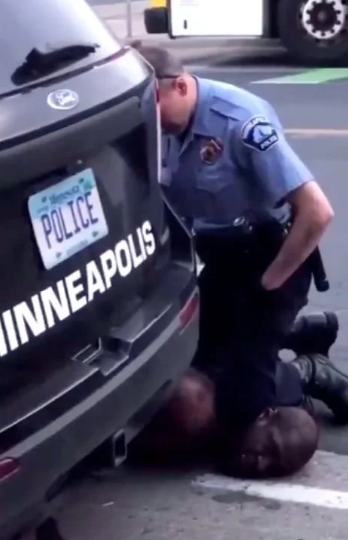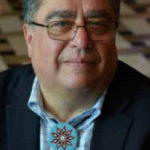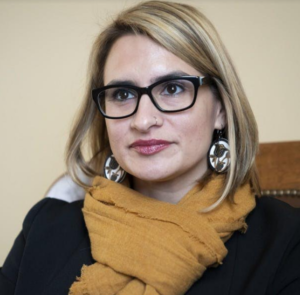
- Details
- By Levi Rickert
There is always a story behind every photograph.
Yesterday I began seeing a photograph out of Minneapolis that continued to show up many times during the day on my Facebook timeline. Since I was working on other things, I will confess I did not pay close attention at first. When I finally did, I saw a white police officer with his knee on the neck of an African American man. As I focused in on the grimace on the man’s face, I froze.
I began to read the story behind the photograph.
The photograph captures George Floyd, 46, on the pavement as veteran Minneapolis police officer, Derek Chauvin, has his knee firmly pressed on Floyd’s neck, leaving him deprived of air to breathe. News accounts reported that Floyd repeatedly told Chauvin he could not breathe. We learned Floyd was already arrested for forgery because he allegedly attempted to pay for something at a nearby retail shop with a counterfeit $20 bill. He was handcuffed and thrown to the pavement. In all, there were four officers in proximity to Floyd. The other three officers did nothing to stop Chauvin as he pressed the life out of Floyd. He lost consciousness and was pronounced dead at a local Minneapolis hospital.
In essence, Floyd received the death penalty for a petty crime.
 Levi Rickert
Levi Rickert
This photograph has quickly become indelible in my mind. When I look at it, I find myself comparing it to the photograph of the lynching of Emmett Till, a 14-year-old teen from Chicago who was murdered while visiting Mississippi by an angry Southern mob.
Fast forward 65 years and now you have another enduring image of a white man suffocating an African American victim, this time using a knee instead of a rope.
Today, as I reflected on the Minneapolis Police Department, I remembered Minneapolis was the birthplace of the American Indian Movement in 1968. Its founders were fed up with the large number of urban American Indians being rounded up each weekend, beaten and then hauled off to jail in paddy wagons.
In research funded by the Center for Indian Country Development at the Federal Reserve Bank of Minneapolis and St. Catherine University entitled, “Police Stops and Searches of Indigenous People in Minneapolis: The Roles of Race, Place, and Gender,” the authors write:
“In the United States, Native Americans have the highest prevalence of fatal encounters with law enforcement of any racial or ethnic group. Yet these encounters are rarely covered in the media – for each fatal police shooting of a Native American there is an average of less than one media story."
According to the Centers for Disease Control and Prevention (CDC), American Indians, on a per capita basis, are more likely to die at the hands of law enforcement than any other racial or ethnic group in the United States.
 Minn. Lt. Gov. Peggy Flanagan
Minn. Lt. Gov. Peggy Flanagan
Today, Lt. Governor Peggy Flannagan, who is a dual citizen of the White Earth Nation of Ojibwe, during a COVID-19 update, offered her opinion on the tragic death of Floyd. She said Minnesota is grieving over the tragedy and expressed her outrage.
“One thing is clear to me, the complete lack of humanity in the video of George’s death is horrifying to me. We will get answers and we will seek justice. It goes without saying that no one should be treated differently by law enforcement due to the color of their skin and no one should live in fear of law enforcement because of the color of their skin” Flannagan said.
She talked about the systemic racism that allowed Floyd’s death to happen and shared a dream for a transformation as we move from the pandemic.
“Someday when it is safe, we will all have the option to go back to normal, though we cannot let that happen. Normal—quote, unquote—means that black and brown bodies are not safe. Normal was not working for us. We must not get back to normal, we must get back to better,” she said.
I love the concept of Flannagan’s dream - striving not to get back to normal, but to get back to BETTER. I hope it becomes our reality and we never have to see another unnecessary death of a black or brown person on the streets of our cities again. We cannot go back to normal; we must get back to BETTER.
Levi Rickert (Prairie Band Potawatomi Nation) is publisher and editor of Native News Online.
More Stories Like This
Native News Weekly (August 25, 2024): D.C. BriefsNavajo Nation Mourns the Passing of Former Vice President Rex Lee Jim
Deb Haaland Earns Endorsement From Communications Workers of America Local 7076
University Soccer Standout Leads by Example
Two Native Americans Named to Democratic Congressional Campaign Committee's“Red to Blue” Program
Help us defend tribal sovereignty.
At Native News Online, our mission is rooted in telling the stories that strengthen sovereignty and uplift Indigenous voices — not just at year’s end, but every single day.
Because of your generosity last year, we were able to keep our reporters on the ground in tribal communities, at national gatherings and in the halls of Congress — covering the issues that matter most to Indian Country: sovereignty, culture, education, health and economic opportunity.
That support sustained us through a tough year in 2025. Now, as we look to the year ahead, we need your help right now to ensure warrior journalism remains strong — reporting that defends tribal sovereignty, amplifies Native truth, and holds power accountable.
 The stakes couldn't be higher. Your support keeps Native voices heard, Native stories told and Native sovereignty defended.
The stakes couldn't be higher. Your support keeps Native voices heard, Native stories told and Native sovereignty defended.
Stand with Warrior Journalism today.
Levi Rickert (Potawatomi), Editor & Publisher

